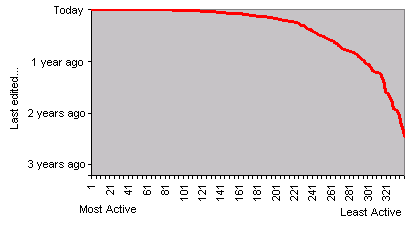We went for a sunday lunch pub meet up with some wikipedia enthusiasts last Sunday. It took us a while to get this organised (and I even ended up doing a bit of the organising) but eventually the turn out was pretty good.
In the pub we had a few others like me, but actually most were wikipedia sysops and some were even more “powerful” within the chaotic organisation of wikipedia. I’m an enthusiastic wikipedia contributor, or at least I’m enthusiastic about what wikipedia represents. I am fascinated by wiki technology, and the processes that it facilitates within wikipedia (the most extreme example of a wiki). I would say I have a deep understanding of this, but actually as far contributing goes, I only dip in and edit articles briefly when I spot somewhere I can make a quick improvement.
I met James F. who is on the wikipedia arbitration committee, and Theresa knott who used to be, and WJBscribe who is current chair of the mediation committee. What this basically means is, these people dedicate a lot of time and energy into keeping wikipedia going. These are the people who essentially have the “final say” with a calming voice of reason, when disputes turn nasty. I have a lot of admiration for them, but I wouldn’t want to take on the task myself.
What do I mean by “disputes”? Wikipedia encourages good will among contributors, as it opens up every article to public editing. Anyone can edit anything, and provided people act in good faith, that might be the end of the matter; the encyclopaedia just gets built… bit-by-bit, collaboratively. Remarkably this actually works a lot of the time. Unfortunately this is not always a harmonious collaboration. You may have to engage in a discussion to persuade others not to revert your edit. Where there is discussion, there may be debate, which leads to arguments, which lead to furious rows. Still, the people involved in such a row are allowed to edit the articles. To prevent the disputes raging out of control across the community, there are hierarchies and layers of permissions, and processes for “mediation” and ultimately “arbitration”. The people on the mediation and arbitration committee must regularly deal with people who will argue their cases politely (otherwise they would just be blocked), but who are simmering with anger and vitriol.
Seth Finkelstein’s critical description of wikipedia as an “elaborate hierarchical structure which is infested with cliques and factional conflicts” isn’t so inaccurate, but what does he expect? It’s an open community of volunteer editors in which the voices of sanity and calm need to somehow triumph when debates erupt. Perhaps he could suggest a better way of organising it (Instead he seems to be deeply concerned about the state of Jimmy Wales’ ex-girlfriend’s biography article). The mediation and arbitration committee have a kind of a position of power at the top of some hierarchy, but it looks like hard emotionally draining work. Clearly they are an essential part of what allows wikipedia to keep running smoothly. I am grateful that some people have the energy to do it.
Anyway… Those guys obviously enjoyed the opportunity to meet up face-to-face, chatting enthusiastically about organisational voting processes, and other such topics which went way over my head. The rest of us had some more down-to-earth chit-chat about general topics of interests. I briefly showed people some OpenStreetMap stuff before laptop battery died. This was all good fun. Hopefully we can arrange another London meet-up pretty soon.

